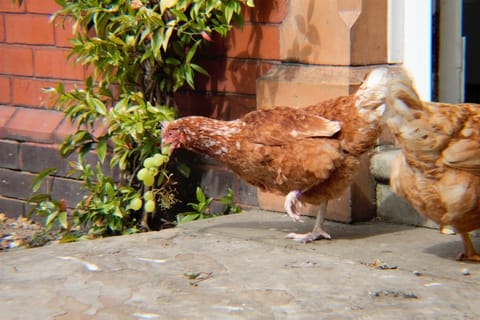This entry was posted on 25 June 2021 in Keeping Chickens.
As part of our series on rehoming battery hens, it’s time to explore how to care best for your new chickens.
If you’ve recently rehomed battery hens, we’ve put together some helpful tips to support you as you care for your new flock.
Rehomed chickens will need time to adjust. They need a little extra care, attention, and affection while they’re adapting to their new living environment. If you know what to expect, you can provide the best care for any former battery hens you rehome.
A lot of the challenges ex-battery hens pose are similar to any new hens you adopt. The extra care they need shouldn’t put anyone off rehoming battery hens; you get to experience your chickens finding happiness and freedom again after being in confinement. Once they settle into their new chicken coop, they require no more attention than any other chicken but offer a rewarding and fun experience.

It’s a huge transition for battery hens to go from inhumane conditions to a free-range environment. Even if it’s best for their health and happiness long-term, they may act strangely during the first few months of living in their new chicken coop.
As every chicken owner knows, chickens are loving and friendly animals that are easy to form a positive relationship with. Battery hens, however, may be tentative and even scared of you after rehoming them. This isn’t anything you’ve done, it’s because of their mistreatment at the hands of their previous owners, and stress caused by their previous environment. Stress is also a reason why they may not lay eggs for a few months.
There are some normal behaviours all chickens will exhibit: nesting, foraging, perching, and dust bathing. Chickens also need to exercise and perform comfort behaviours. Often battery hens won’t have been able to behave in a way that comes naturally to them because they have been kept in confined conditions. It takes some time for former battery hens to get used to their newfound freedom, but with care and affection, they will soon be behaving as you would expect.
Battery hens, as previously mentioned, could be scared of any humans they encounter after being rehomed. This may result in them behaving aggressively to their new owners. They may also attack and peck at other hens being kept in the same enclosure as them. These reactions can be prevented, and any risks reduced, by introducing new birds slowly to the flock.
Chickens, not only battery hens, can exhibit aggressive behaviours if they’re bored and kept in poor living conditions. Give any birds you’re rehoming time to adjust to their new chicken coop by separating them from the rest of the flock. Keep them close by, preferably in a neighbouring pen so it isn’t a shock when you bring them together.
Battery cages are so small that chickens are unable to even stretch their wings, let alone move around freely. While these behaviours comfort the birds, and are essential to their happiness, living in a battery environment is also detrimental to their health. A lack of exercise causes muscular atrophy and leads to weak bones which may lead to injuries and long-term health conditions.
Chickens coming out of a battery environment may also not have full plumage. A common myth is that they won’t grow their feathers back, but this is not true. As the hens adjust to their new chicken coop and have the freedom to behave normally, their feathers will regrow. With attention and care, ex-battery hens will begin to look healthy and happy as they adjust to their new home.
If you know what to expect when rehoming battery hens, you can manage their care better. Don’t be surprised if your rescued chickens do not exhibit the same behaviour as other members of your flock. Former battery hens may choose to sleep on the floor, rather than on their perches, but as they gain confidence, new routines can be established.
One of the biggest factors in helping your battery hens settle into their new home is a high-quality chicken coop. To nurture the birds back to full health and happiness, chicken owners need to provide nutritious food and water, spacious outdoor chicken runs, and a safe and comfortable place for them to sleep. Choose the right chicken coop for your feathered friends, so you can experience the fun and rewarding experience of rehoming battery hens.
At Cocoon Chicken Coops, we build and supply high-quality chicken coops and runs that ensure your feathered friends are the life and soul of your garden. With our chicken coops, your chickens will be chirping with happiness all year round. Get in touch with our friendly team if you need help choosing a coop or have any questions regarding our products.

« The Rewarding Experience of Adopting and Rehousing Battery Hens